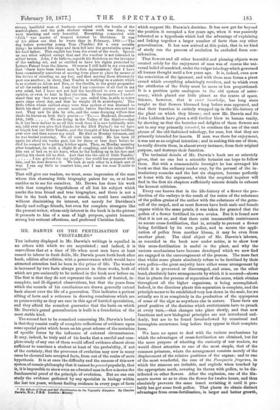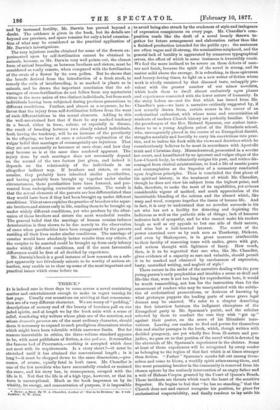MR. DARWIN ON THE FERTILISATION OF VEGETABLES.*
THE industry displayed in Mr. Darwin's writings is equalled in no others with which we are acquainted ; and indeed, it is marvellous that at a time of life when most men have at least ceased to labour in fresh fields, Mr. Darwin pours forth book after book, edition after edition, with a perseverance which would have attracted attention had he been in the prime of life. The wonder is increased by two facts always present in these works, both of which are pre-eminently to be noticed in the book now before us. The first is that they do not represent the results of hurried, in- complete, and ill-digested observations, but that the years from which the records of his conclusions are drawn generally extend back almost over the life of a generation. This indicates a patient sifting of facts and a reticence in drawing conclusions which are as praiseworthy as they are rare in this age of hurried speculation, and they afford the soundest guarantee that the basis on which Mr. Darwin's grand generalisation is built is a foundation of the most stable kind.
The second fact to be remarked concerning Mr. Darwin's books is that they consist really of complete collections of evidence upon some special point which bears on his great scheme of the mutation of specific forms by the influence of external circumstances. It may, indeed, be truly said of his books that a careful and coin- pletetstudy of any one of them would afford evidence almost alone sufficient to convince a student at least of the probability, if not of the certainty, that the processes of evolution may now in many cases be elevated into accepted facts, from out of the realm of mere hypothesis. It is at once the difficulty and the success of this new system of cosmic philosophy that it cannot beprovedpopularly, that is, it is impossible to show even an educated man in five minutes the fundamental proof of the principle of evolution. But no one can study the evidence gathered by any specialist in biology within the last ten years, without finding evidence in every page of facts
* The Effects of Cross and Self Fertilisation in the Vegetable Kingdom. By Charles Darwin, MA, F.H.S. London; Murray.
which support Mr. Darwin's doctrine. It has now got far beyond the position it occupied a few years ago, when it was passively tolerated as a hypothesis which had the advantage of explaining and linking together a larger number of facts than any other generalisation. It has now arrived at this point, that in no kind of study can the process of evolution be excluded from con- sideration.
That flowers and all other beautiful and pleasing objects were created solely for the enjoyment of man was of course the uni- versal belief of mankind, under the vulgar teleology which governed all human thought until a few years ago. It is, indeed, even now the conviction of the ignorant, and with them man forms a pivot round which everything admiringly revolves, and to which even the attributes of the Deity must be more or less proportioned- It is a position quite analogous to the old system of astro- nomy, which placed our little planet as the centre of space. Science, however, that is exact knowledge, has long since taught us that flowers bloomed long before man appeared, and that their function is entirely wrapped up in the life-history of the plant on which they bloom ; and now Mr. Darwin and Sir John Lubbock have given a still further blow to human vanity, by showing us that the beauties and delights of these flowers are not in any way primarily intended, to continue the use of the cant phrase of the old-fashioned teleology, for man, but that they are primarily intended for insects. If man was there for enjoyment, it was not as an original intention ; and in making this use of them, he really diverts them, in almost every instance, from their original purpose, and destroys their function.
The technical details of Mr. Darwin's book are so minutely given, that no one but a scientific botanist can hope to follow them. But with a commendable foresight he has arranged his book so that the ordinary reader may, by the perusal of the in- troductory remarks and the last six chapters, become perfectly at home with the argument, whilst the sceptical inquirer will find in the first six chapters sufficiently minute details to exhaust the keenest criticism.
Every one knows that in the life-history of a flower the pro- duction of the embryo is the result of the union of the substance of the pollen-grains of the anther with the substance of the germ- cell of the carpel, and as most flowers have both male and female organs within the same petals, it was taken for granted that the pollen of a flower fertilised its own ovules. But it is found now that it is not so, and that there exist innumerable contrivances to secure cross-fertilisation, that is, actually to prevent a flower being fertilised by its own pollen, and to secure the appli- cation of pollen from another bloom, it may be even from another plant. The chief object of Mr. Darwin's labours, as recorded in the book now under notice, is to show how this cross-fertilisation is useful to the plant, and why the various mechanisms have become developed which we now find are engaged in the encouragement of the process. The mere fact that whilst some plants absolutely refuse to be fertilised by their. own pollen—the great majority have either some arrangement by which it is prevented or discouraged, and some, on the other hand, absolutely have arrangements by which it is secured—shows that in plants the process of separation of the sexes, which obtains throughout all the higher organisms, is being accomplished. Indeed, in the dicecious plants this separation is complete, and the principle seems to be established very low down in the scale, for.we actually see it as completely in the production of the zygospores of some of the algce as anywhere else in nature. These facts are proof positive of the doctrine which evolutionists have to preach at every turn,—that changes take place slowly, and that new functions and new biological principles are not introduced sud- denly, but are to be found foreshadowed by occasional and incomplete occurrence long before they appear in their complete form.
We have no space to deal with the various mechanisms by which the advantages of cross-fertilisation are obtained, but for the mere purpose of whetting the curiosity of our readers, we would direct attention to one of the most simple, that of the common primrose, where the arrangement consists merely of the displacement of the relative positions of the organs ; and to one of the most wonderful, the case of the Posogueria fragrans, in which the stamens are irritable, and explode when touched by the appropriate moth, covering its thorax with pollen, to be dis- tributed on other flowers. After the explosion, one of the fila- ments moves so as to close the flower for twelve hours, and thus absolutely prevents the same insect revisiting it until it pro- bably has got some fresh pollen. That plants do obtain distinct advantages from cross-fertilisation, in larger and better growth,
and by increased fertility, Mr. Darwin has proved beyond a doubt. The evidence is given in the book, but its details are beyond our province, and space remains for only a brief examina- tion of what may be considered as the practical application of Mr. Darwin's investigations.
The very injurious results obtained for some of the flowers ex- perimented upon by self-fertilisation cannot be obtained in animals, because, as Mr. Darwin very well points out, the closest form of animal breeding, as between brothers and sisters, must be considered as really remote, when compared with the fertilisation of the ovule of a flower by its own pollen. But he shows that the benefit derived from the introduction of a fresh stock, to remedy the evils of interbreeding, is as marked in plants as in animals, and he draws the important conclusion that the ad- vantages of cross-fertilisation do not follow from any mysterious virtue in the mere union of two distinct individuals, but from such individuals having been subjected during previous generations to different conditions. Further, and almost as a sequence, he be- lieves that the injury from self-fertilisation follows from the want of such differentiations in the sexual elements. Adding to this the well-ascertained fact that if there be any marked tendency in a breed, either in form, colour, or especially in disease, the result of breeding between two closely related individuals, both having the tendency, will be an increase of the peculiarity in the offspring, we have at once a scientific explanation of the vulgar belief that marriages of consanguinity are injurious. That they are not necessarily so becomes at once clear, and how they may become so is at the same time rendered apparent. The injury done by such marriages does not necessarily depend on the second of the two factors just given, and indeed it depends on the relationship of the individuals in an altogether indirect way. If brothers and sisters, or even cousins, they probably have inherited similar peculiarities, and having probably been brought up together under similar circumstances, these peculiarities have been fostered, and pre- vented from undergoing correction or variation. The result is that the sexual elements of the parents are less differentiated than they would have been if they had been brought up under different conditions. This at once explains the practice of breeders who separ- ate brothers and sisters early in life, sending them to be brought up under widely different conditions, yet who produce by the after- union of these brothers and sisters the most wonderful results. The general belief that the marriage of human cousins induces deterioration is thus shown to be due merely to the observation of cases when peculiarities have been exaggerated by the parents residing all their lives under similar conditions. The marriage of cousins would have absolutely better results than any others, if the couples to be married could be brought up from early infancy under widely different conditions, and if the most favourable differences could be first of all decided by experience.
Mr. Darwin's book is a good instance of how research on a sub- ject apparently too frivolously minute to be worthy of serious at- - tention, may enable us to clear up some of the most important and practical issues which come before us.



































 Previous page
Previous page